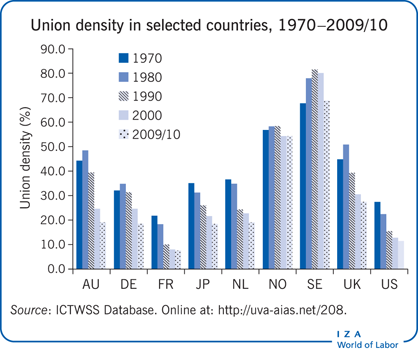Elevator pitch
The micro- and macroeconomic effects of the declining power of trade unions have been hotly debated by economists and policymakers. Nevertheless, the empirical evidence shows that the impact of the decline on economic aggregates and firm performance is not an overwhelming cause for concern. However, the association of declining union power with rising earnings inequality and a loss of direct communication between workers and firms is potentially more worrisome. This in turn raises the questions of how supportive contemporary unionism is of wage solidarity, and whether the depiction of the nonunion workplace as an authoritarian “bleak house” is more caricature than reality.

Key findings
Pros
Trade unions under certain bargaining structures can have favorable macro consequences by being less aggressive in their wage bargaining.
Trade unions can have favorable micro outcomes by stimulating worker voice.
Trade unions can facilitate contracting where there are benefits to a long-term relationship between the employer and the worker.
Trade unions have historically reduced wage inequality.
There has been a reversal of adverse union effects, where observed.
Cons
Trade union monopoly power is bad, and its exercise may lead to a misallocation of resources.
The basis of pro-productive union effects is vague while there exist alternative, non-union voice mechanisms.
Governance procedures are not exclusive to union regimes and by design may lower rent-seeking behavior injurious to firm performance.
Unions may no longer reduce wage inequality or support redistributive policies.
Reductions in union power may directly underpin a reduction in the disadvantages of unionism.